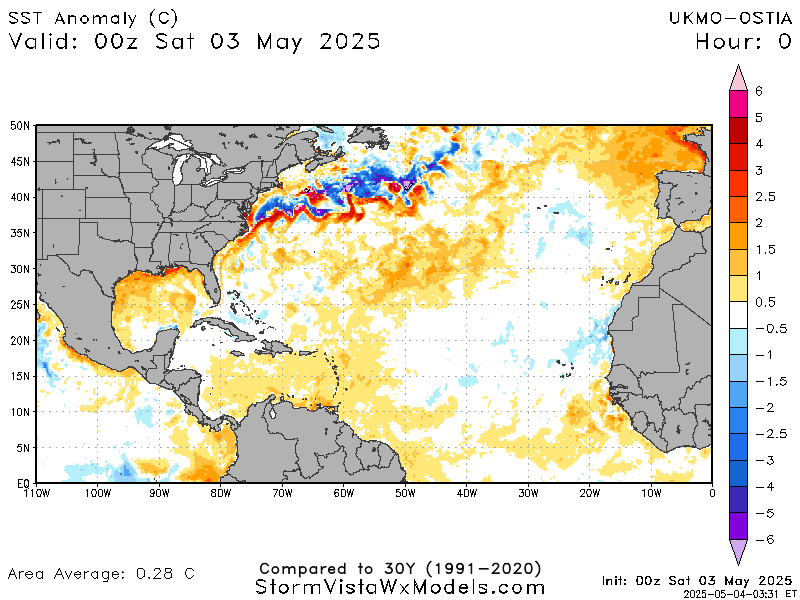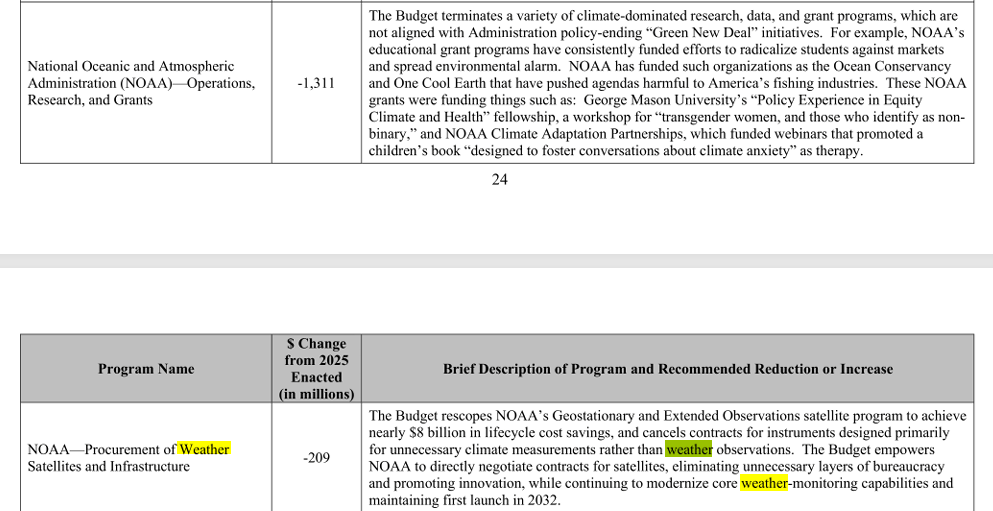Speaking from the meteorology point of view, because we are meteorologists and this is a blog about weather, the upcoming hurricane season has few question marks at the moment. We expect a somewhat active but not crazy active season. We do expect a few more big storms than a normal season. And there is broad consensus on this to this point.
How have water temps done since the end of April? Not a whole lot has changed. The basin remains above normal overall, and the changes over the last two weeks have been negligible overall. The Gulf has warmed some, but the Atlantic and Caribbean have been basically unchanged.

Remember, the Gulf can be prone to some decent fluctuations over shorter periods of time. But in general, it’s warm and has gotten warmer. It’s currently sitting in the middle of the pack of warmer than normal years at this point; not insanely warm but definitely above normal.
At this point, there’s not a ton new to say, and so we wait.
Hurricane season may be a minor social experiment this year
So when we start talking budgets and NOAA and things like that, we’re aiming to do it from an apolitical lens. In other words, I don’t want to travel too far down the road of advocacy or politics. But I feel we need to be honest with our readers about…things. Because this affects our work too. We’ve got a few things to note today.
First off, the White House’s discretionary budget proposal for 2026 was released last week. In a normal world, what typically happens is they unveil their priorities for cuts and increases and then Congress does the messy work of putting something together that works for themselves and can be signed by the president. And in most cases, when something deemed extreme is proposed, Congress will generally say “Woah, let’s tap the brakes there, guys.” Particularly when it comes to critical things. Well, we got an idea of what the Trump Administration wants to do with NOAA and the National Weather Service last week.
Throughout the budget there are cuts proposed to various elements related to climate and resiliency and mitigation. For NOAA, they’re in line for a $1.3 billion budget cut. Ignoring the political tone of these descriptions above, on the surface it would seem the administration is supportive of weather forecasting, so long as you completely ignore anything climate related. For one, in order to understand weather, you do need to understand climate, so the cuts to “unnecessary climate measurements” are actually somewhat hurtful overall. They are actually necessary.
Secondly, if you combine this with the “passback” document that was releases a couple weeks ago, it’s evident that these cuts extend beyond climate change and will impact weather research and hinder the stated goal above of “continuing to modernize core weather-monitoring capabilities.” To be quite honest, it’s tough to rectify the above stated goals with the commentary the administration has published in the passback document. So which is it? I don’t know. I do know that Congress is supportive in a bipartisan manner of the National Weather Service and their lifesaving, property-saving work and mission. And I would expect Congress to propose nothing short of fully funding the already somewhat underfunded agency. Whether the current administration is willing to go along with that is an open question, of course.
But once more, the above stated goal from the White House’s own document is to focus on weather monitoring an observations. Late last week, Andrew Freedman, who is a journalist I know personally and have a good deal of respect for published an article at his new home at CNN. Between layoffs, “strongly encouraged” early retirements, and pre-existing vacancies, the NWS is a wreck right now. One-quarter of NWS offices lack a “meteorologist-in-charge,” which is the equivalent of the chief meteorologist of each individual office. Here in my home of Houston, as we’ve previously discussed, we currently lack an MIC, the warning coordination meteorologist, and the science and operations officer, as well as an electronic system analyst. There is literally no leadership at the Houston office.
I want to be careful and clear here: Those that have remained in the NWS are eminently qualified individuals that are going to do their absolute best in a bad situation. These people are dedicated public servants. That said, anytime you’re working in a job where there is a significant absence of leadership, that does absolutely nothing good for anyone’s growth and development or morale. Remember, the Houston area is literally one of, if not the most disaster-prone in America.
Other offices without MICs include New York City, Cleveland, Milwaukee, Indianapolis, Cincinnati/Columbus, Tampa, all of Kentucky, and St. Louis. According to Freedman, the Goodland, KS is no longer open 24/7. More troubling, per Freedman’s article, 90 vacancies exist among staff tasked with repairing observation sites and Doppler radars. On Friday here in Houston, unrelated to NWS cuts but a glaring example of an issue that is realistically possible in this environment, radar data was unable to be transmitted beyond the NWS office due to a data outage. And it was a critical weather day here. If the radar does go down at some point this summer, it’s an entirely realistic scenario to consider where we’d have issues seeing data as a hurricane approaches. Some people may be willing to take that risk, but I’m not sure that’s exactly prudent.
Anyway, the point of all this is to say: The NWS is an absolute mess right now because of some systemic hiring issues that pre-dated Trump II, Biden, and Trump I, but were made dramatically worse by policies and directives of the current administration. The current set of budget proposals from the current administration would most likely further degrade the NWS’s capability to achieve their mission objectives and will impair all meteorologists (public and private) from providing the most accurate forecasts and making strides in improving them any further. And aside from all that, unless the administration acts with haste to re-hire or hire anew for the many vacant positions that currently exist within the agency, we are looking at a degraded, minimalist NWS just in time for hurricane season. Literally, the actual basic functions of the agency are at risk at the moment. Again, this is fact, not an opinion. This is the current world we’re living in today. Not in 2026 or 2027. Right now.
For other disaster-related news…
Between the above and what I’ve read from the authors below, that’s why I think we’re just going to have to kind of see how things go this year. It’s not a normal environment this hurricane season.
I want to shout out four authors doing fantastic work on the ins and outs of the current state of disaster, mitigation, and resiliency. These are areas we usually won’t wade into for obvious reasons. But if you want to dig deeper and understand more, this is where I’d start. Their work long pre-dates the current administration and has been raising alarm bells for years.
Andrew Rumbach: A senior Fellow at the Urban Institute that writes about place-based plans & policies for disaster risk reduction, recovery, adaptation & resilience.
Samantha Montano: A true disasterologist who is an expert on FEMA, disasters, and emergency management.
Colleen Hagerty: “My World’s on Fire” author that’s a journalist that writes smartly about the intersection of disaster and society, as well as how policies will impact people and communities.
Susan Crawford: A senior fellow at the Carnegie Endowment for International Peace. Crawford writes about the link between finance and climate adaptation. Her work is excellent.
Following these four will give you probably more than you ever knew you needed about disasters and disaster policy. But in 2025, that is good knowledge to have.


Appreciate your knowledge and candor. Thank you.
I hope all the people who voted for this step on legos
thank you for keeping us aware
Thanks for keeping us informed and being factual and up front about the NOAA situation. The lack of foresight and thoughtfulness by the current administration is creating a lot of uncertainty about many things and it looks like weather forecasting and research are going to be on the list.
Appreciate you, and your ability to keep the facts coming.
Thank you for your hype-free analysis! May we all weather the coming storms.
Thank you, Matt. Climate change is real. I shake my head every day at what the “current administration” is doing & the people who believe they are doing the right thing. I appreciate your & your fellow colleagues’ hard work & efforts to keep us informed & safe.